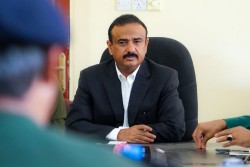Royal Navy capable of safeguarding shipping in the Gulf, says UK minister
- 2019-08-27 17:06:16


 Pierre Rayer: Art, Science, and Happiness: The Universal Mission of Transmission to Future Generations through Patronage at the Louvre Abu Dhabi
Pierre Rayer: Art, Science, and Happiness: The Universal Mission of Transmission to Future Generations through Patronage at the Louvre Abu Dhabi Ahly crowned Super champions after dramatic extra-time win over Modern Future FC
Ahly crowned Super champions after dramatic extra-time win over Modern Future FC Yemeni Honey..A Development Wealth Threatened By Conflict And Climate Change
Yemeni Honey..A Development Wealth Threatened By Conflict And Climate Change California wildfires: Millions warned of possible power cut
California wildfires: Millions warned of possible power cut Central African rebels launch attacks near capital
Central African rebels launch attacks near capital Al-Alimi to Meet Saudi Defense Minister Over Hadramout and Al-Mahra Developments
Al-Alimi to Meet Saudi Defense Minister Over Hadramout and Al-Mahra Developments Muslim Brotherhood Leader Threatens to Strike the White House
Muslim Brotherhood Leader Threatens to Strike the White House Government Recovers Bodies of 20 Fighters in Tribal-Mediated Exchange with Houthis in Marib
Government Recovers Bodies of 20 Fighters in Tribal-Mediated Exchange with Houthis in Marib Racist and antisemitic false information spreads online following Bondi Beach terrorism attack
Racist and antisemitic false information spreads online following Bondi Beach terrorism attack Shabwa Governor Orders Swift Legal Action Over Unlawful Tribal Execution That Shocked Yemen
Shabwa Governor Orders Swift Legal Action Over Unlawful Tribal Execution That Shocked Yemen
